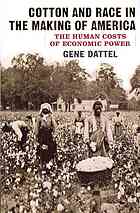Product desciption
Cotton And Race In The Making Of America The Human Costs Of Economic Power 1st Pbk Ed Gene Dattel by Gene Dattel 9781442210196, 9781566639682, 9785243318303, 1442210192, 1566639689, 5243318302 instant download after payment.
"For more than 130 years, from the early nineteenth century until the mid-twentieth, cotton was the leading export crop of the United States. And the connection between cotton and the African-American experience became central to the history of the republic. America's most serious social tragedy, slavery and its legacy, spread only where cotton could be grown. Both before and after the Civil War, and well into the twentieth century, blacks were relegated to work the cotton fields. Their social and economic situation was aggravated by a pervasive racial animosity and fear of a black migratory invasion that caused white Northerners to contain blacks in the South. Gene Dattel's pioneering study explores the historical roots of these central social issues. In telling detail, Mr. Dattel shows why the vastly underappreciated story of cotton is a key to understanding America's rise to economic power. When cotton production exploded to satiate the nineteenth-century textile industry's enormous appetite, it became the first truly complex global business and a driving force in U.S. territorial expansion and sectional economic integration. It propelled New York City to commercial preeminence and fostered independent trade between Europe and the United States, providing export capital for the new nation to gain its financial "sea legs." And without slave-produced cotton, the South could never have initiated the Civil War, America's bloodiest conflict. Cotton continued to exert a powerful influence on both the American economy and race relations in the years after the Civil War. Mr. Dattel's skillful historical analysis identifies the commercial forces that cotton unleashed and the pervasive nature of racial antipathy it produced. This is a story that has never been told in quite the same way before, related here with the authority of a historian with a profound knowledge of international finance."--Publisher's description.
Abstract: "For more than 130 years, from the early nineteenth century until the mid-twentieth, cotton was the leading export crop of the United States. And the connection between cotton and the African-American experience became central to the history of the republic. America's most serious social tragedy, slavery and its legacy, spread only where cotton could be grown. Both before and after the Civil War, and well into the twentieth century, blacks were relegated to work the cotton fields. Their social and economic situation was aggravated by a pervasive racial animosity and fear of a black migratory invasion that caused white Northerners to contain blacks in the South. Gene Dattel's pioneering study explores the historical roots of these central social issues. In telling detail, Mr. Dattel shows why the vastly underappreciated story of cotton is a key to understanding America's rise to economic power. When cotton production exploded to satiate the nineteenth-century textile industry's enormous appetite, it became the first truly complex global business and a driving force in U.S. territorial expansion and sectional economic integration. It propelled New York City to commercial preeminence and fostered independent trade between Europe and the United States, providing export capital for the new nation to gain its financial "sea legs." And without slave-produced cotton, the South could never have initiated the Civil War, America's bloodiest conflict. Cotton continued to exert a powerful influence on both the American economy and race relations in the years after the Civil War. Mr. Dattel's skillful historical analysis identifies the commercial forces that cotton unleashed and the pervasive nature of racial antipathy it produced. This is a story that has never been told in quite the same way before, related here with the authority of a historian with a profound knowledge of international finance."--Publisher's description


